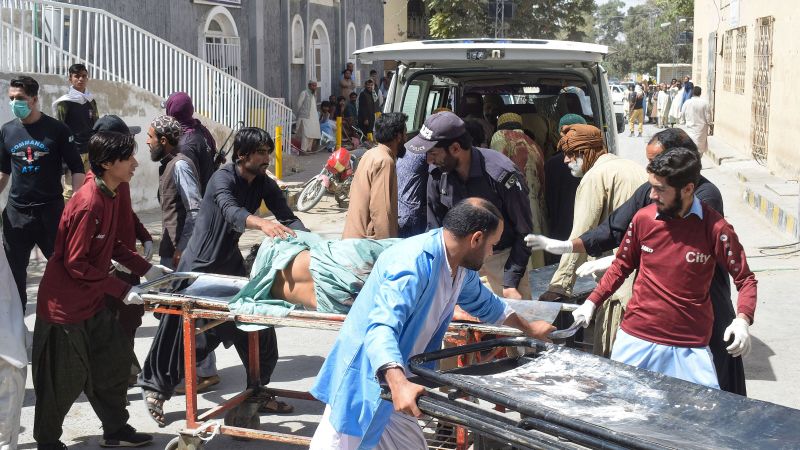At least 52 people were killed and dozens more wounded in what authorities believe was a suicide attack at a religious procession in southwest Pakistan Friday.
The explosion occurred in the Mastung district of the restive Balochistan province, as people celebrated the birthday of the Prophet Mohammed, the information minister of the province Jan Achakzai told CNN.
Balochistan, Pakistan’s largest province by area, has seen a decades-long insurgency by separatists who demand independence from the country, citing what they say is the state’s monopoly and exploitation of the region’s mineral resources.
Meanwhile, a separate blast took place during Friday prayers at a mosque near Peshawar City in the northwestern Khyber Pakhtunkhwa province, killing at least two people and injuring 11.
Local police told CNN two explosions had occurred at the mosque in Hangu, causing its roof to collapse and potentially trapping worshipers inside.



So I’m more aware of the geopolitics in this region than other Americans, but can I get a fat summary of what’s going on and the history of it? If I remember correctly India and Pakistan have a history of not liking each other right?
This might have been Islamic extremists, usually the Pakistan Taliban (which is a different organization than the Afghan Taliban, mind) however they have denied responsibility. It might be a different group, multiple islamic terrorist groups are active in the country.
However, it may be terrorism from Balochistan insurgent groups. Balochistan is the largest and poorest province in Pakistan, but Pakistan likes to keep a tight hold on it, since there are a lot of minerals and natural gas reserves there.
The insurgency in Balochistan is quite low level, and their push for an independent Balochistan is not widely popular. However, there is widespread distrust and resentment towards the Pakistani Government and especially the Army.
The government and army in a bid for maintaining control and suppressing the insurgency and any ideas of succession have been running a draconian anti-terror operation for decades which includes arbitrary detention, torture of suspected terrorists, silencing of critics and imprisonment without trial or unfair trials.
These kinds of anti-terror campaigns are not unusual in Pakistan. However, there is a difference here compared to similar surprisingly popular campaigns in KPK province, in that the security forces there are usually ethnic KPK natives, and there is the widespread use of the frontier corps which is a paramilitary unit that exclusively recruits locals especially in practically independent remote tribal regions.
The security forces of Pakistan are largely composed of people from KPK, Punjab and the Muhajir ethnic group. These security forces in Balochistan can be racist towards Balochi people, and are seen as outsiders stepping on Balochi necks.
There has been covert and explicit support from India for Balochistan succession. Pakistan has credibly accused India of funding, supplying and training some of the insurgent forces to destabilize the region and the country as a whole. There is also loud support in Indian media for Balochistan’s succession as well as widespread astroturfing campaigns. The general feeling is that this support is blatantly self serving, and not aligned with what the actual people in Balochistan want.
Again, succession is both unpopular and practically unfeasible (despite mineral and gas reserves Balochistan is otherwise incredibly resource poor especially lacking in arable land and water). You could say that India is supporting succession rather than the campaign for more transparency and better civil rights in the anti-terror campaigns because the former is unlikely and will massively harm the country as a whole, while the latter will probably help Pakistan and Balochistan become more integrated with the country.
It should be noted that Balochi nationalist parties, are very popular but not separatists ones. The provincial assembly just dissolved ahead of elections but before that the party in power was the Balochi Awami (people’s) Party, a nationalist center left, progressive, party that is in support of federalism.
The current (caretaker) PM of Pakistan is an independent who used to be a part of the BAP before resigning to become the caretaker PM, since the caretaker PM is supposed to be neutral to ensure a fair election.
Perfect write up thank you! Sad to hear how long and drawn out all this is, what’s the most likely resolution in the end?
Honestly there will probably be no resolution. Pakistani Intelligence services will put pressure on their contacts in the insurgent groups, find and kill the planners of the attack. But nothing otherwise will change. There could be a long term resolution if Balochistan gets richer somehow, and therefore more influential.
It should be noted that the Pakistan intelligence services are an incredibly Machiavellian group. They quite often tend to know where every terrorist group is based, what they are planning, who and where the leaders are, etc.
So why don’t they do anything about it? Well, having a terror group on the payroll is very useful sometimes. Whether you want a politician dead, an Afghan Taliban member surveilled or dead, need to justify funding. Now they aren’t the illuminati, they don’t control them directly, they just tend to just not care when the terrorist groups are targeting someone they don’t like.
Again not the illuminati and there have been times when they fuck up, including a Taliban attack on the Army Public School, Peshawar, a K-12, where the Taliban specifically went for the older kids of security forces personal as they are less replaceable. Astoundingly evil honestly, was the country’s 9/11 moment for sure.
If you want to get an idea of how the politics of Pakistan work, ‘The Assassination’ (of Benazir Bhutto) by the BBC World Service is incredibly insightful. It’s from a reporter who was very close to the ex-PM and witnessed everything first hand.